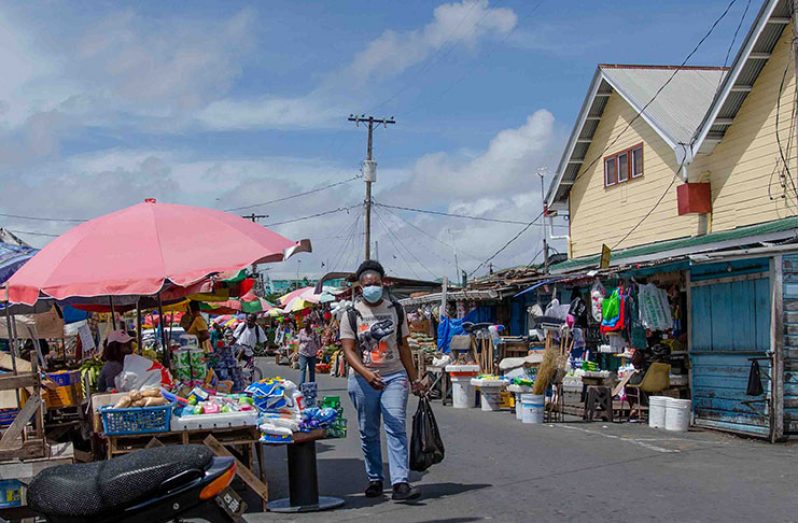…outdoor dining permitted as Guyana enters phase three of ‘reopening
EVEN as Guyanese are being encouraged to stay safe and safeguard themselves against the deadly Novel Coronavirus (COVID-19), they have been afforded more time to conduct their daily affairs, as government reduced the time for the national curfew in some regions.
This and other amended measures, which form part of phase three of government’s four-phased reopening exercise, will take effect from July 18, 2020 and last until July 31, 2020 or August 3 for some regions. Guyana has seen a consistent rise in cases of COVID-19, with the country recording 314 cases to date, with 19 deaths. And, while the control measures are being adjusted, government has assured that emphasis will be placed on high-risk areas.
For instance, while the national curfew has been adjusted for some regions, areas such as Aranka and Arangoy in Region Seven (Cuyuni-Mazaruni) and Moruca in Region One (Barima-Waini), which have recorded a steady rise in cases, will have to abide by the existing 18:00hrs to 6:00hrs curfew.
Conversely, the curfew shall not apply to Regions Five (Mahaica-Berbice) and Six (East Berbice-Corentyne) from Monday to Friday, but shall be in effect on Saturdays and Sundays. Every other region will have to abide by the curfew every day.
Additionally, the public sector will resume work on a rotation basis unless otherwise instructed by their respective minister of head of agency.
Government has also permitted outdoor dining at restaurants from 6:00hrs to 18:00hrs, under strict conditions. Food services and restaurants will be permitted to be open for delivery, drive-thru, curb-side pick up and take away service from 6:00hrs to midnight, daily.
Public transportation services, except in Aranka, Arangoy and Moruca, are permitted to operate at a 75 per cent passenger capacity.
Government has also cleared the way for private sector construction to resume, and for clothing, shoes and book stores to resume operations.
While these measures allow persons to traverse more freely, it remains imperative that persons adhere to the social distancing guidelines and not gather in groups of more than 10, and also wear a face mask in public at all times. The wearing of face masks in public has been considered a requirement by government.
As authorities continue to relax some of the measures and simultaneously get a grip on the local situation, it was ordered that the Cheddi Jagan International and Eugene F. Correia International Airports remain closed to all international flights except for outgoing flights, cargo flights, medical evacuation flights, technical stops for fuel only and special authorised flights.
These emergency measures were made pursuant to paragraphs (1) and (2) (b) of the Direction by the President, David Granger, given under the Public Health Ordinance, Cap. 145, and published in the Gazette, Legal Supplement- B, March 16, 2020.
These measures may be terminated, extended or amended by notice of the Minister of Public Health, after an assessment of the prevailing public health conditions.
In March, the Guyana Chronicle reported that a “cavalier approach” in the face of the COVID-19 pandemic could ‘seriously’ impair government’s efforts to combat the virus.
Such an approach from the public could result in consequences which will be devastating for the entire population, said President Granger in a message to the nation, in March.
“Guyanese, I urge you to continue to support all medical professionals: doctors, nurses, and other caregivers. I urge you also to practice social distancing in public places and to avoid crowds, ceremonies including funerals and large gatherings,” said President Granger.
He had also advised persons to remain calm and implement all guidelines relating to personal hygiene and infection prevention and control.
According to the World Health Organisation (WHO), COVID-19 is an infectious disease caused by a newly discovered coronavirus.
WHO said most people infected with the COVID-19 virus will experience mild to moderate respiratory illness and recover without requiring special treatment. Older persons and those with underlying medical problems like cardiovascular disease, diabetes, chronic respiratory disease, and cancer are more likely to develop serious illness.
WHO believes that the best way to prevent and slow down transmission is to be well informed about the COVID-19 virus, the disease it causes and how it spreads.
“Protect yourself and others from infection by washing your hands or using an alcohol-based rub frequently and not touching your face. The COVID-19 virus spreads primarily through droplets of saliva or discharge from the nose when an infected person coughs or sneezes, so it’s important that you also practice respiratory etiquette (for example, by coughing into a flexed elbow),” WHO advised.
At this time, there are no specific vaccines or treatments for COVID-19. However, there are many ongoing clinical trials evaluating potential treatments.


.jpg)











